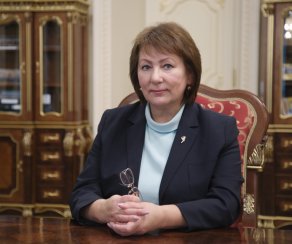Contact center of the Ukrainian Judiciary 044 207-35-46

The President of the Supreme Court participated in the IX International Forum on the Case-Law of the European Court of Human Rights, which took place virtually on 9-10 December 2020.
In her opening speech, Valentyna Danishevska noted that the last year's Forum mentioned three ways in which standards of the Council of Europe and the ECtHR should be developed in Ukraine. They include relevant and appropriate application of the Court’s legal positions, national prevention of violations, and actions to address violation found by the Court by means of ensuring the systematic execution of its judgments.
"Over the last year, we moved on in the implementation of each of these tasks," the President of the Supreme Court said.
Judgments of the ECtHR concerning Ukraine that are in the process of execution, have been analyzed by the Supreme Court in co-operation with the Ministry of Justice of Ukraine, Department for the Execution of Judgments of the ECtHR and experts from the Pravo-Justice project.
The analysis found that there are almost 600 of such judgments. They are structured by violated Articles of the ECHR. About 40% of these judgments concern violation of Article 6 (right to a fair trial). In almost 30% – there are violations of Article 3 (prohibition of torture). Violations of other Articles are less common, but in sum, we still have 9% of violation of Article 8 (right to respect for private and family life), 8% – of Article 5 (right to liberty and security), and 6% – of Article 2 (right to life).
"This analysis opens for Ukraine a further path to move on, both at the legislative level and at the level of co-operation between the bodies responsible for execution. It also directs development of case-law. But, of course, the priority actions should be taken on the legislative level", Valentyna Danishevska emphasized.
In addition, the President of the Supreme Court notified that this year the Committee of Ministers of the Council of Europe had ended its supervision of a number of cases after having studied the Supreme Court's case-law, which demonstrated positive changes in Ukraine in the context of violations, found in such cases as «Lizanets v. Ukraine», «Grimkovska v. Ukraine», «East/West Alliance Limited v. Ukraine», «Yakushev v. Ukraine» and «M. T. v. Ukraine».
The Supreme Court publishes monthly reviews of the ECtHR judgments in cases concerning Ukraine and other member states of the Council of Europe, and when considering particular cases, the Supreme Court analyzes the relevant case-law of the ECtHR.
«These measures, without doubts, have impact on the level of awareness of the ECtHR case-law by Ukrainian judges, as well as on its proper application, when they consider similar cases», Valentyna Danishevska underlined.